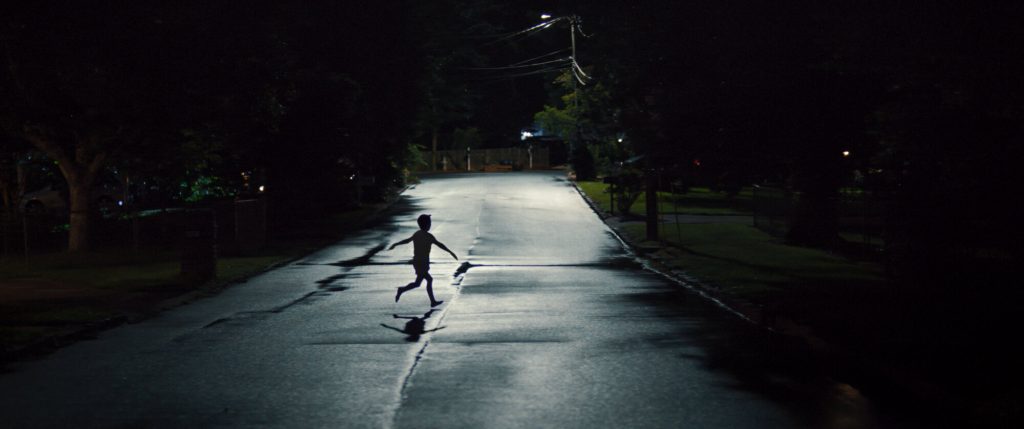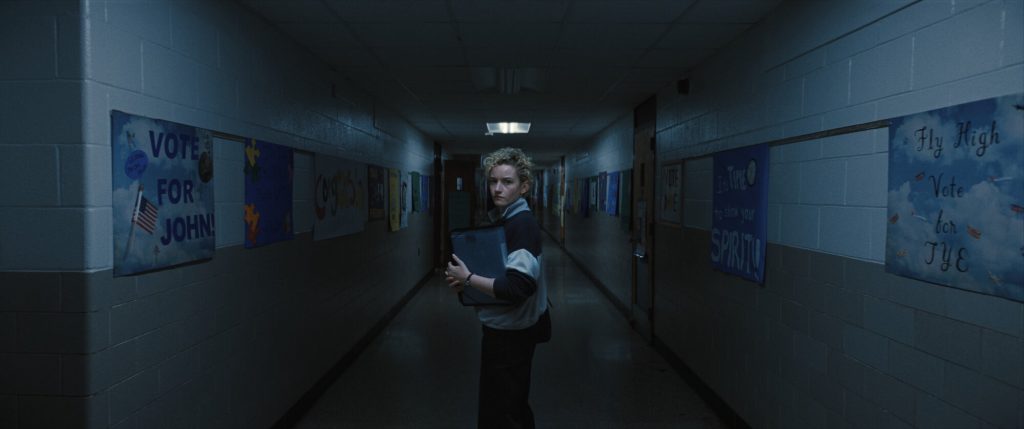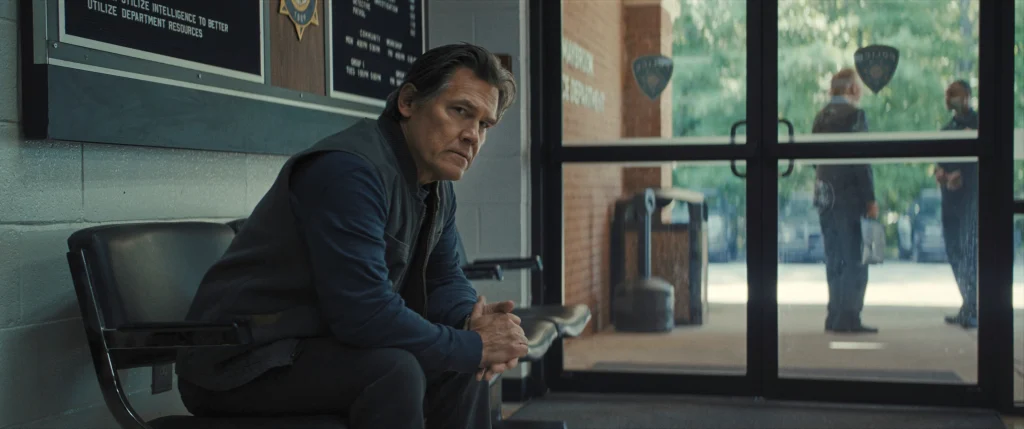
Set in the small town of Maybrook, Weapons begins with a nightmare: nearly all of teacher Justine Gandy’s (Julia Garner) students vanish overnight. Only one boy, Alex (Cary Christopher), remains—a haunting detail that throws Justine into the crosshairs of the community, the media, and her own alcoholism.
From here, the film unfolds across six chapters, each tied to a different character’s perspective. There’s Justine, the scapegoated teacher; Archer Graff (Josh Brolin), a grieving father suffocating under paranoia; Officer Paul Morgan (Alden Ehrenreich), a cop undone by his moral failures; and supporting arcs that include Sara Paxton and Justin Long as parents processing tragedy in their own fractured ways.
What elevates this structure is its execution. Each perspective picks up from a shared moment, but instead of repeating scenes, the film continues them from a new angle, reframing events entirely. It’s seamless, effortless, and unlike Tarantino’s flashy use of chapterization, here the device is woven invisibly into the narrative. You’re not watching a stylistic trick—you’re living in six different realities that sync together into one haunting whole. The script even grounds the mystery with recurring detail: a single timestamp—2:17 AM—that binds the vanishing together, a quiet motif that haunts every chapter.
Cregger’s use of semi-POV cinematography is nothing short of mesmerizing. It’s not strict first-person, but it places you alongside the characters, sharing their vision, before pulling back into third-person without jarring cuts. The effect is intimate, disorienting, and deeply immersive. Beyond semi-POV, Cregger leans on a catalogue of camera moves—precise follow shots, tracking pushes, and striking compositional angles—each chosen to guide our gaze and heighten the claustrophobic intimacy of the scene.
Pair this with Larkin Seiple’s cinematography and some of the year’s sleekest editing, and you get a film that moves like liquid. Each transition hooks you, carrying you into the next moment without pause. For a film divided into chapters, the rhythm is astonishingly smooth. It’s proof that technical innovation doesn’t need to be loud—it can be invisible and still revolutionary.

Shot in Atlanta in mid-2024, the suburban setting of Maybrook is more than backdrop—it’s a character. The production design feels lived-in, the color palette muted and decayed, reflecting a society quietly rotting beneath its surface. It’s horror that emerges not from monsters, but from the fragility of community and its readiness to scapegoat.
Every scene is purposeful. There are no fillers here: encounters, reversals, and symbols are placed with precision. The writing shows its labor at every turn, with a constant sense of unpredictability. Jump scares are rare but brilliantly staged—designed with the kind of misdirection that fools even veteran horror fans. And in a stroke of audacity, Cregger sprinkles moments of dark humor. Comic beats appear late—effective but concentrated—a stylistic choice that some may feel upsets the pacing in the final act even as it punctures tension with expertly timed relief.
The film even tips its hat to horror history with a subtle homage to The Shining—not as imitation, but as conversation with the genre’s past.
As for symbolism, the title itself provokes debate. Weapons. Are we the weapons? Are communities ticking bombs, primed to self-destruct under paranoia and fear? Cregger offers no answers, and whether you find that ambiguity frustrating or profound will depend on how much closure you expect from horror.
Julia Garner delivers a magnetic performance, balancing compassion with the fury of someone unjustly vilified. Josh Brolin brings gravitas to a father unraveling under grief, while Alden Ehrenreich embodies institutional decay with uncomfortable ease. Sara Paxton and Justin Long shine as parents coping in sharply different ways, reminding us there’s no single script for grief. And Cary Christopher, as the lone surviving boy, anchors the film with a quiet but unsettling presence.
Beyond the screen, Weapons is an industry case study. Warner Bros. leaned heavily into mystery, crafting trailers that teased without spoiling, embedding ominous ticking clocks into the audio mix. On TikTok, the film became a cultural moment before its release.
The gamble worked. Weapons opened to $42.5 million domestically, the third-biggest horror debut of 2025. With a 94% Rotten Tomatoes score, 81 on Metacritic, and an A– CinemaScore, it proved both critics and audiences were ready for a horror film that thought beyond jump scares and gore.

Not all is flawless. Though there were brilliantly inserted comedic scenes that doesn’t distract you from the tense narrative of the movie, it appeared very late towards the end but some may argue its because the resolution is coming so it’s a proper time to release some smiles and maybe giggles, The villain reveal feels underdeveloped, missing the emotional punch it promises. The lack of a true bond in the climax leaves some storylines hanging, and the ending’s refusal to explain divides opinion sharply. For some, it’s brave; for others, it’s unsatisfying. Either way, it’s a choice that ensures conversation long after the credits roll.
After the surprise success of Barbarian (2022), Zach Cregger could have taken the easy path and delivered another claustrophobic thriller. Instead, he auctioned a bold original script for a staggering $38 million—a Hollywood bidding war that signaled just how hotly anticipated his sophomore film would be. The result, Weapons, is one of the most ambitious and carefully crafted genre films of 2025, a story as much about fear itself as it is about the supernatural.
Weapons is not just a horror film. It’s suspense, thriller, social critique, and cinematic experiment in one. It bends genres, plays with form, and keeps you locked to the screen—not with cheap anxiety, but because it’s impossible to look away.
Zach Cregger has delivered a film that’s meticulously directed, immaculately shot, and masterfully marketed. It challenges audiences while entertaining them, refusing to compromise. Call it horror if you like, but Weapons is really something new: a reminder that original voices still have the power to shake cinema.
CINEAIRO Rating: 8/10
